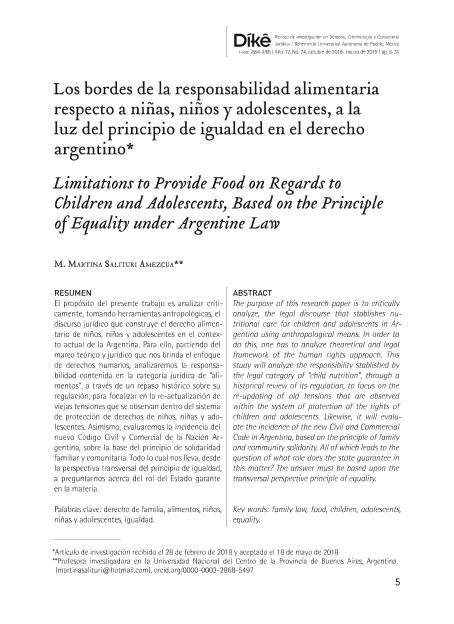Mostrar el registro sencillo del ítem
dc.contributor.author
Salituri Amezcua, María Martina

dc.date.available
2021-02-12T13:52:42Z
dc.date.issued
2019-03
dc.identifier.citation
Salituri Amezcua, María Martina; Los bordes de la responsabilidad alimentaria respecto a niñas, niños y adolescentes, a la luz del principio de igualdad en el derecho argentino; Benemérita Universidad Autónoma de Puebla; Díkê. Revista de investigación en Derecho, Criminología y Consultoría Jurídica; 12; 24; 3-2019; 5-31
dc.identifier.uri
http://hdl.handle.net/11336/125574
dc.description.abstract
El propósito del presente trabajo es analizar críticamente, tomando herramientas antropológicas, el discurso jurídico que construye el derecho alimentario de niños, niñas y adolescentes en el contexto actual de la Argentina. Para ello, partiendo del marco teórico y jurídico que nos brinda el enfoque de derechos humanos, analizaremos la responsabilidad contenida en la categoría jurídica de “alimentos”, a través de un repaso histórico sobre su regulación, para focalizar en la re-actualización de viejas tensiones que se observan dentro del sistema de protección de derechos de niños, niñas y adolescentes. Asimismo, evaluaremos la incidencia del nuevo Código Civil y Comercial de la Nación Argentina, sobre la base del principio de solidaridad familiar y comunitaria. Todo lo cual nos lleva, desde la perspectiva transversal del principio de igualdad, a preguntarnos acerca del rol del Estado garante en la materia.
dc.description.abstract
The purpose of this research paper is to critically analyze, the legal discourse that stablishes nutritional care for children and adolescents in Argentina using anthropological means. In order to do this, one has to analyze theoretical and legal framework of the human rights approach. This study will analyze the responsibility stablished by the legal category of “child nutrition”, through a historical review of its regulation, to focus on the re-updating of old tensions that are observed within the system of protection of the rights of children and adolescents. Likewise, it will evaluate the incidence of the new Civil and Commercial Code in Argentina, based on the principle of family and community solidarity. All of which leads to the question of what role does the state guarantee in this matter? The answer must be based upon the transversal perspective principle of equality.
dc.format
application/pdf
dc.language.iso
spa
dc.publisher
Benemérita Universidad Autónoma de Puebla
dc.rights
info:eu-repo/semantics/openAccess
dc.rights.uri
https://creativecommons.org/licenses/by-nc-sa/2.5/ar/
dc.subject
DERECHO DE FAMILIA
dc.subject
ALIMENTOS
dc.subject
NIÑOS
dc.subject
NIÑAS Y ADOLESCENTES
dc.subject
IGUALDAD
dc.subject.classification
Derecho

dc.subject.classification
Derecho

dc.subject.classification
CIENCIAS SOCIALES

dc.title
Los bordes de la responsabilidad alimentaria respecto a niñas, niños y adolescentes, a la luz del principio de igualdad en el derecho argentino
dc.title
Limitations to Provide Food on Regards to Children and Adolescents, Based on the Principle of Equality under Argentine Law
dc.type
info:eu-repo/semantics/article
dc.type
info:ar-repo/semantics/artículo
dc.type
info:eu-repo/semantics/publishedVersion
dc.date.updated
2021-02-09T18:38:34Z
dc.identifier.eissn
2594-0708
dc.journal.volume
12
dc.journal.number
24
dc.journal.pagination
5-31
dc.journal.pais
México

dc.journal.ciudad
Puebla
dc.description.fil
Fil: Salituri Amezcua, María Martina. Universidad Nacional del Centro de la Provincia de Buenos Aires. Facultad de Derecho; Argentina. Consejo Nacional de Investigaciones Científicas y Técnicas. Centro Científico Tecnológico Conicet - Tandil; Argentina
dc.journal.title
Díkê. Revista de investigación en Derecho, Criminología y Consultoría Jurídica
dc.relation.alternativeid
info:eu-repo/semantics/altIdentifier/url/http://www.apps.buap.mx/ojs3/index.php/dike/article/view/746
dc.relation.alternativeid
info:eu-repo/semantics/altIdentifier/doi/http://dx.doi.org/10.32399/rdk.12.24.746
Archivos asociados
